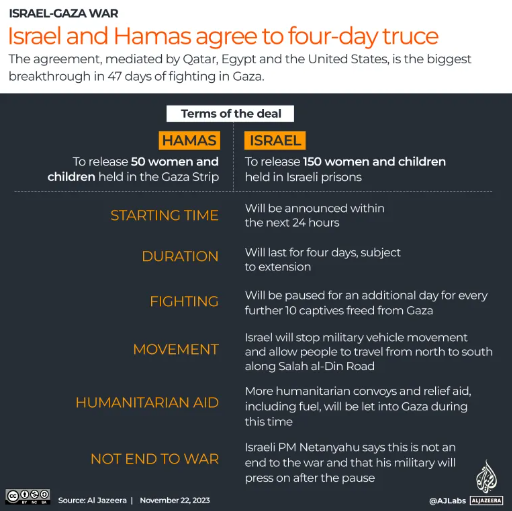Virendra Pandit
New Delhi: Six weeks after the Hamas invasion of Israel, the death of nearly 14,000 people, and wanton destruction later, the Jewish state and the Sunni terror outfit of the Palestinian extremists, have decided to pause their bloody conflict for four days—possibly from Thursday morning–to exchange prisoners and hostages, and allow more humanitarian aid in.
While Hamas agreed to free 50 of the 240-odd Israeli and foreign hostages it took during the October 7 invasion, Israel would release 150 Palestinian prisoners, the media reported on Wednesday.
But Israeli Prime Minister Benjamin Netanyahu reiterated his vow that the ongoing war will continue until Hamas is eliminated as an organization.
Hamas said there would be a “cessation of all military operations” in Gaza during the four days. Israel will halt airstrikes throughout the Gaza strip, and stop flying intelligence drones over the north Gaza, where most of its ground forces are fighting right now, for six hours a day.
Besides, more aid will move into Gaza from Egypt, which Palestinian officials and the United Nations say is required to ease a humanitarian disaster as a majority of over 2.3 million poor Palestinians face starvation and other crises.
The pause, pushed for by the US and its allies led by Qatar, is expected to begin by early Thursday morning by which time the Israeli public could move the courts against the prisoners’ release. Israel’s cabinet has already approved the deal and it’s not expected to be stalled by legal disputes.
Hamas, backed by Iran and designated a terrorist organization by the US and European Union, will initially free 50 women and children held in Gaza. In turn, Israel will release 150 women and Palestinians under the age of 19 from Israeli jails. US officials said three Americans would be among the hostages leaving Gaza.
The fast-changing geopolitical weather, in which the Organization of Islamic Cooperation (OIC) failed to do much, despite the anti-Israeli protests worldwide, and even Iran subtly backed out after throwing Hamas to face the Israeli armed forces, might have forced the terror outfit to the negotiating table, even if briefly.
A second stage of pause could see the halt in fighting extended by one day for the release of every 10 additional hostages, Netanyahu’s office said. The government has released a list of 300 Palestinians that could be freed overall, most of them people arrested since the war began on October 7.
On that day, Hamas raided southern Israeli communities from Gaza, killing around 1,200 people and abducting some 240. Israel retaliated by bombarding Gaza and launched a ground offensive, which the territory’s Hamas-run government says has killed more than 13,000 people.
The hostage talks were fraught and mediated by Qatar, which hosts some of Hamas’s top political leaders, as well as the US and Egypt. The White House will work to ensure the deal is “carried through in its entirety,” President Joe Biden said, underscoring its complexity and the possibility of a breakdown.
These fresh developments come as international pressure grows on Israel to end its offensive in Gaza, much of which has been damaged by airstrikes. Hamas has said thousands of people are reported missing or trapped under the rubble of destroyed buildings.
Qatar said it hoped the “humanitarian pause” would help stop the war and lead to a “comprehensive and just peace process.”
Despite the breakthrough, Netanyahu struck a different tone at the start of a cabinet meeting early on Wednesday, when the deal was announced.
“There is nonsense out there as if after the pause in fighting, we will stop the war,” he said. “We are at war and we will continue it until we achieve all the objectives. We will eliminate Hamas, return all the hostages, and guarantee that there will be no element in Gaza that threatens Israel.”
Heavy fighting between Israeli troops and Hamas continued overnight in northern Gaza. The main thrust of Israel’s ground offensive is into Gaza City, the strip’s biggest urban area and which the military describes as Hamas’s “center of gravity.”
Israeli troops have taken control of many parts of the city’s Al Shifa hospital and over the weekend showed videos they say prove Hamas exploited the facility, building a command center and tunnels underneath.
In recent days Israel said it’s turning its attention to the south of Gaza, signaling the possibility of sending troops there. Israel has urged civilians to evacuate to southern Gaza since the beginning of the war.
Qatar said it will run an operations room that will be in constant contact with Israel, Hamas, the Red Cross, and US officials to ensure all parts of the deal are implemented.

